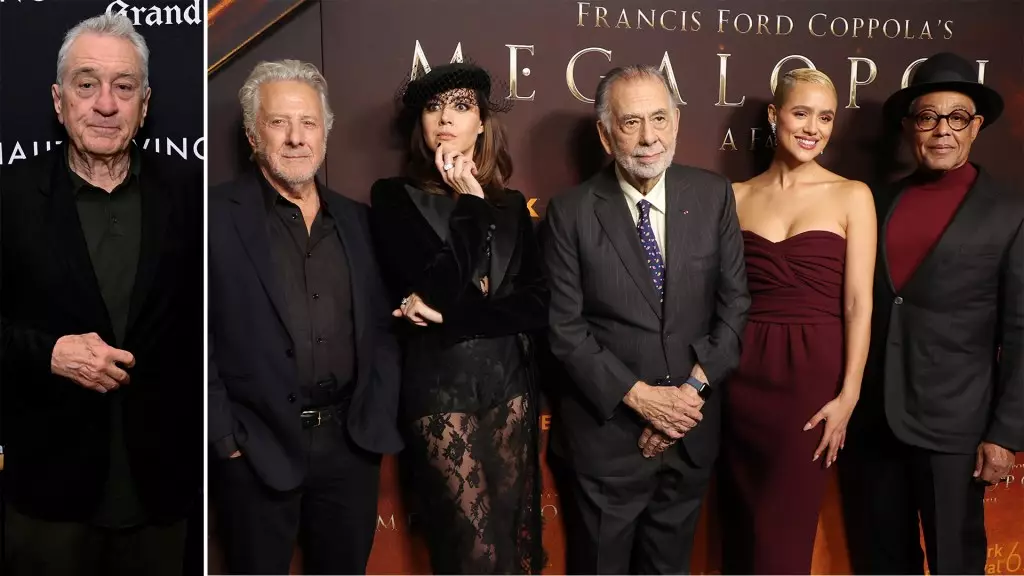At a recent event in New York City marking the premiere of Francis Ford Coppola’s much-anticipated film “Megalopolis,” Robert De Niro provided a moment of levity that masked a deeper critique of political leadership. With a poker face that contrasted sharply with the laughter that erupted from the audience, De Niro suggested a whimsical yet poignant scenario: what if Donald Trump were at the helm of directing this cinematic endeavor? His commentary resonated far beyond mere humor, reflecting the pervasive frustrations around Trump’s approach to governance. De Niro articulated a viewpoint shared by many; the notion that Trump is incapable of uniting or steering anything productive is deeply ingrained in the current zeitgeist. For those who admire structured diplomacy and effective leadership, the inference that Trump would struggle to maintain coherence—both in film and in his political aspirations—serves as a reminder of the anxieties that plague the American political landscape.
“Megalopolis” has long been a passion project for Coppola, evolving over two decades before finally reaching the audience. The film serves as a multidimensional exploration of civilization, chaos, and the human psyche, echoing themes that have become increasingly pertinent amid rising tensions. During a Q&A session post-premiere, De Niro connected the film’s narrative to the current political climate, emphasizing a cultural struggle against perceived threats from those he characterized as “not real Republicans.” His call to action extended beyond art into activism, pushing for collective participation in the upcoming elections. This synchronization between art and political discourse demonstrates how cinema is not merely a form of entertainment but a potential catalyst for change. De Niro’s insights resonate with an audience that is preoccupied not just with stories on screens but also with the unfolding narratives in their own lives.
The collaboration between De Niro, Coppola, and Spike Lee, during the Q&A, illuminated the camaraderie that exists within the realm of cinema. The trio shared nostalgic memories that hinted at their individual journeys through the cinematic landscape of the 1970s and beyond. Their interactions underscore a sense of solidarity and kinship forged through shared experiences and a mutual love for storytelling. As they reminisced, it became evident that their bond is strengthened by a common belief that cinema has the power to provoke thought and, more importantly, instigate action.
Lee’s emphasis on the necessity of voter registration reinforced the idea that the film community can transcend its artistic boundaries. The desire to forge ahead politically, as Lee quoted his sister saying, reminds us that sometimes progress requires more than mere contemplation; it requires mobilization. The stakes referenced by Lee reflect a broader uncertainty that characterizes the contemporary electoral landscape—one that artists like him systematically aim to influence through their craft.
Coppola’s role as a filmmaker who brings diversity of thought into his casting choices adds another layer of complexity to the conversation. He hinted at the idea that differing political beliefs should not preclude collaboration in the arts. By acknowledging the participation of actors with divergent political views, he proposed a harmonious engagement that could also reflect a broader societal discourse. This idea raises critical questions about the environment surrounding art and its creation—namely, how can differing perspectives coexist to enrich the artistic narrative?
Coppola’s faith in humanity prevailing on a film set symbolizes a broader hope amid socio-political divisiveness. It proposes the possibility of multi-faceted dialogues that can thrive even when opinions are polarized. In essence, the process of filmmaking can serve as an microcosm of society; if filmmakers choose to unify rather than divide, they might just set an example worth emulating in real-world politics.
The premiere event of “Megalopolis” became more than a showcase of Coppola’s artistic endeavor; it transformed into a platform for discussing pressing social issues. De Niro’s humor, buoyed by a weighty political subtext, painted a picture of an artistically engaged community that feels the urgency of the moment. Through their dialogue, the trio of talented individuals highlighted the intersections of cinema and civic duty, illustrating how art can be a reflection of, and response to, the world around us.
The final takeaway from the evening, underscored by the thoughts of De Niro, Lee, and Coppola, is a call for vigilance and action within their audience. As filmgoers, we are urged not only to consume the narrative on screen but to actively participate in the stories being written outside of it. Creativity, much like citizenship, demands engagement; it serves as a reminder that the world we desire is within our grasp if we dare to reach for it.

Leave a Reply